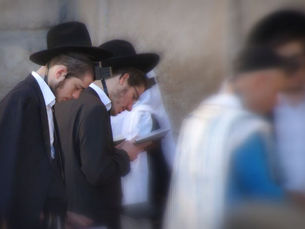top of page
PREVIOUS HALACHOT


Birkat Kohanim With Love
I heard a Kohen can’t give a beracha if he’s in a dispute with a fellow is that true?
If there is unresolved hatred, tension, or animosity between a Kohen and members of the congregation, the Kohen is required to leave the room before the blessing of Retzeh in the Amidah. This is because Birkat Kohanim must be recited be’ahavah, with love and sincere affection toward the people.
Halacha Moment
2 min read


Proper Behavior of the Congregation During Birkat Cohanim
What is the proper behavior of a congregation during Birkat Cohanim? Because there is an opinion that the Yisraelim also fulfill a mitzvah by receiving the beracha, one who is present in the Shul when the Cohanim are called up should not leave until after Birkat Cohanim has been completed. Even if one has already heard Birkat Cohanim earlier that day, it is still considered improper to leave the Shul at the time the Cohanim ascend to give the blessing.
Halacha Moment
2 min read


The Recitation of Birkat Cohanim
How should birkat cohanim be recited?
The Cohanim must be careful to recite each word of the blessing in unison, beginning each word only after the Chazzan has completed it, and ensuring not to prolong the words more than the other Cohanim. [1] When reciting words that end with a Chaf Sofit—such as “Yevarechecha,” “VeYishmerecha,” “Eilecha,” “Viyichuneka,” “Eilecha,” and “Lecha”—as well as the word “Shalom,” the Cohanim turn slightly to their left and right.
Halacha Moment
2 min read


When is Birkat Cohanim Said?
When is Birkat Cohanim said?
Birkat Cohanim is recited during Shacharit, Musaf, and Ne'ilah. However, it is not performed during Mincha. The reason for this is a halachic concern that a Cohen might have consumed wine earlier in the day, and a Cohen who is even slightly intoxicated is forbidden from performing Birkat Cohanim, as it requires a state of clarity and purity.
Halacha Moment
2 min read


What is Birkat Cohanim?
The Mitzvah of Birkat Kohanim is a biblical commandment (Deorayta) and applies in all places and at all times—even today. It originates from the verse, "דַּבֵּר אֶל-אַהֲרֹן וְאֶל-בָּנָיו לֵאמֹר, כֹּה תְבָרְכוּ אֶת-בְּנֵי יִשְׂרָאֵל: אָמוֹר, לָהֶם" — “Speak to Aharon and his sons, saying: This is how you shall bless the Children of Israel.”
Halacha Moment
2 min read


Learning During Chazarat HaShatz?
What are the halachic guidelines for behavior during Chazarat Hashatz?
May one learn during Chazarat Hashatz?Those who are meticulous to fulfill the mitzvah of wearing both Tefillin of Rashi and Tefillin of Rabbenu Tam should be careful not to remove their Rashi Tefillin and put on the Rabbenu Tam Tefillin during Chazarat Hashatz. [1] This is because Chazarat Hashatz requires complete attention and participation, and any form of distraction or interruption even for a mitzvah.
Halacha Moment
2 min read


Sitting Or Standing During Chazarat HaShatz
Does one sit or stand during Chazarat HaShatz?
There are differing halachic opinions regarding whether one must stand during Chazarat HaShatz. Most Ashkenazic poskim encourage standing throughout the repetition. Among Sephardim, the widespread custom is to sit during Chazarat HaShatz; however, it is considered praiseworthy to stand.
Halacha Moment
2 min read


Answering Amen During Chazarat HaShatz
When the Shaliach Tzibbur recites the Chazarat HaShatz, the congregation is obligated to listen attentively and respond with "Amen" at the conclusion of each beracha. This communal response is not merely ceremonial; it is an essential part of the tefillah. If there is no minyan of individuals responding "Amen," the berachot recited by the Shaliach Tzibbur may be considered close to berachot levatalah, blessings said in vain.
Halacha Moment
2 min read


What Is Chazarat HaShatz?
Why do we repeat the Shemonah Esrei after the silent amidah?
Originally, this enactment was instituted to assist individuals who were unable to pray on their own—either because they lacked the necessary knowledge or the ability to read the prayers properly. The repetition allowed them to fulfill their obligation by listening attentively and answering “Amen” to each blessing.
Halacha Moment
2 min read


The First "Pasuk" in Shemoneh Esrei
Why do we say "Hashem, sefatai tiftach u’fi yagid tehilatecha" before Shemoneh Esrei?
The verse “Hashem, sefatai tiftach u’fi yagid tehilatecha” (“Hashem, open my lips, and my mouth will declare Your praise” – Tehillim 51:17) was instituted to be said immediately before beginning the Shemoneh Esrei. This pasuk serves not only as a beautiful introduction, asking Hashem to help us speak His praise properly, but also carries a deeper meaning.
Halacha Moment
2 min read


Direction Of Prayer
What direction does one pray in?
If one is outside of Eretz Yisrael, they should face toward Eretz Yisrael, and in their heart have intent to direct their prayer toward Yerushalayim, the Beit HaMikdash, and the Kodesh HaKodashim, meaning, one should envision themselves standing in the Holy of Holies in the Beit HaMikdash in Yerushalayim.
Halacha Moment
2 min read


Lost The Place/Focus During Shemoneh Esrei
I lost my place during Shemoneh Esrei what should i do?
If someone begins to doze off during Shemoneh Esrei or loses their place for any reason, many poskim rule that they should go back to the last beracha they are unsure about and continue from there.
Halacha Moment
3 min read


Unsure If One Prayed Shemoneh Esrei
What does one do if one isn't sure if they prayed Shemoneh Esrei?
If one is uncertain whether they already recited Shemoneh Esrei, they should pray again, but with a conditional stipulation making it a tefillat nedavah (voluntary prayer). The wording of this stipulation is: “If I am obligated to pray, let this prayer fulfill my obligation. If I am not obligated, let it be considered a voluntary offering”. In this case, one does not need to include a new personal request or id
Halacha Moment
2 min read


Proper Kavanah During Shemonah Esrei
What kavanah should one have by Shemoneh Esrei? It is essential for a person to have kavanah, focused intention and awareness, when praying Shemoneh Esrei, as this prayer is the heart of the daily tefillah and represents one’s personal audience with Hashem. Ideally, one should concentrate deeply on the meaning of every word throughout the entire Shemoneh Esrei. However, if someone finds it difficult to maintain such sustained kavanah, halacha places special emphasis on the fi
Halacha Moment
3 min read


Taking Three Steps Back After Shemona Esrei
What are the halachot regarding taking three steps before or after Shemoneh Esrei when someone is davening behind you?
If one has completed Shemoneh Esrei but the person behind them is still praying, it is forbidden to take three steps back—even if the person behind began Shemoneh Esrei later.
Halacha Moment
2 min read


Walking In Front Of Someone Praying
Can one walk in front of someone praying Shemonah Esrei?
It is forbidden to walk directly in front of someone who is praying within four amot. However, it is permitted to walk behind them or to their sides. Some explain that the reason for this prohibition is that walking in front of someone disrupts their kavanah (concentration).
Halacha Moment
3 min read


Bowing In Shemonah Esrei
When does one bow during Shemonah Esrei?
How does one bow?
Halacha Moment
3 min read


What Is A Makom Kavuah?
What exactly is a Makom Kavuah?
One should establish a makom kavua—a fixed place—for tefillah, and make an effort to consistently pray in the same seat and the same shul. This halacha specifically applies to the Shemoneh Esrei, which should ideally be recited from a designated spot each day. If one is unable to attend shul and must pray at home, it is still proper to designate a specific place in the house for tefillah.
Halacha Moment
2 min read


Proper Way To Recite Shema
What's the correct way to recite shema?
Shema should preferably be recited aloud, as speaking the words out loud enhances one’s concentration. However, it is permitted to say Shema quietly, as long as it is loud enough that one can hear oneself. If, after the fact, one recited it so softly that even they could not hear their own voice, they have still technically fulfilled their obligation, though it is not the ideal way to perform the mitzvah.
Halacha Moment
3 min read


Walking During Shema
May one walk during Shema?
It is forbidden to walk while reciting the first pasuk of Shema ("Shema Yisrael Hashem Elokeinu Hashem Echad") and Baruch Shem Kevod Malchuto LeOlam Va’ed, as these are the most central declarations of Hashem’s unity and kingship, and they require complete stillness and focused attention.
Halacha Moment
2 min read
bottom of page


